Rich Hill’s baseball resurrection. The pitcher’s odyssey from failure to a $48 million Dodgers contract
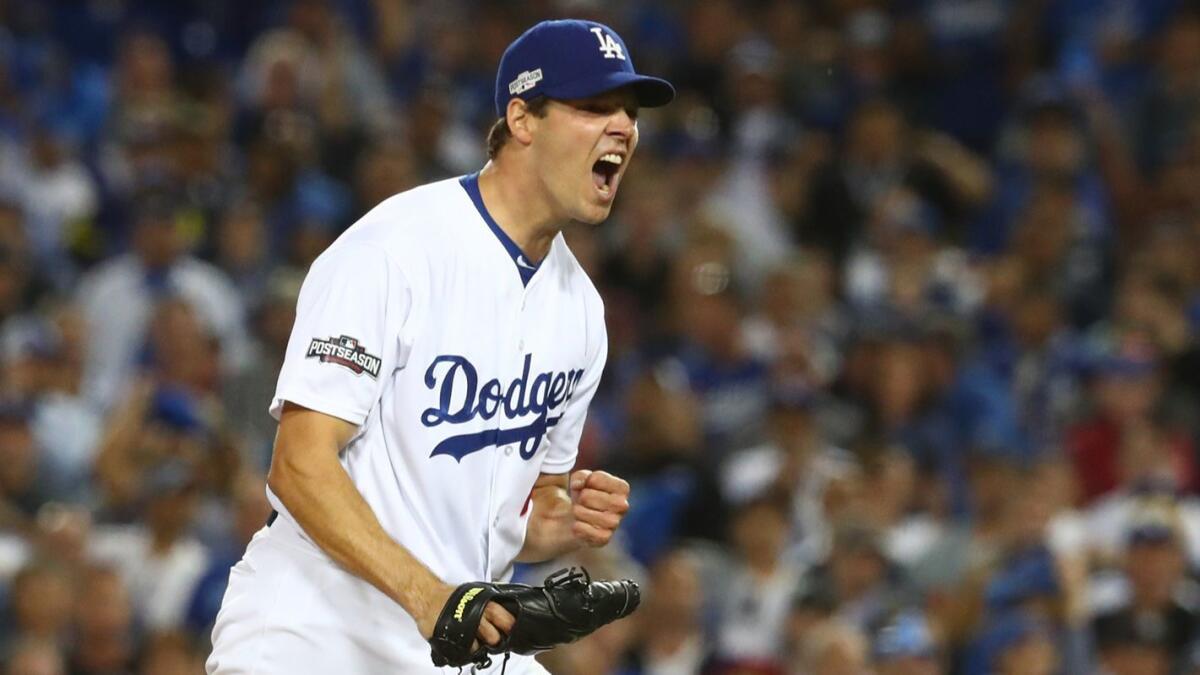

Rich Hill gripped the podium and stared at the speech he’d spent the week writing. He operates without fear on the pitcher’s mound, but public speaking can still jostle his nerves.
Before him sat hundreds of members of the Middlesex County Chamber of Commerce, who sipped orange juice and coffee inside the ballroom of a Radisson off Interstate 93, waiting to hear from their 2017 honoree for Role Model of the Year.
Hill’s nose kept sniffling, his voice catching in his throat. He had sat on the dais as speakers feted him with compliments and the crowd showered him with a 22-second standing ovation.
One man referred to Hill as a “true role model.” Another suggested the students in attendance should try to emulate his “positive outlook, hard work, dedication and never-quit attitude.” A third commended Hill as an “example for others to follow.”
Hill has heard these sentiments often in the wake of his baseball resurrection, an odyssey that led him to a three-year, $48-million contract with the Dodgers. He often does not know how to respond. Standing before the crowd, he tried to relay the wisdom of his experience.
“In a way, I’m a role model for failure,” Hill said. “My first suggestion for 2017 is to go out and fail — but fail at something you have passion for. I’m standing here today because I’ve failed more often than I’ve succeeded.
“Without struggle, there is no progress. Without failure there is no progress.”
Hill understands loss. He carried it with him each day as he navigated from baseball’s valley to its peak. In June 2015, he was 35, unemployed and spinning curveballs to teenagers on an American Legion field. In December of 2016, he signed the largest contract for any free-agent starting pitcher.
In his remarks, Hill stressed the necessity of preparation, conviction and perspective: Be ready for opportunity. Follow your passion. Place a stone in a bucket each day and watch the pile grow. Do not succumb to adversity, because “if baseball has taught me anything, it’s that the failures on the field will pale in comparison with what life will throw at you.”
Hill has lived his advice. When his body betrayed him, he spent years rebuilding it. When his industry pigeonholed him, he rejected the appraisal. When he lost his infant son, he resolved to cherish each passing moment.
He does not seek to be an inspiration but he is willing to inspire.
“I believe everyone in them has something that is special and unique,” Hill said a day earlier. “It can be anything on the spectrum of life. But if you hold onto it and don’t let anybody see it, it just gets wasted. It goes to the grave.”
A day before his speech, inside a gym at an industrial park in suburban Boston, Hill snatched a pair of dumbbells off a rack. As he lay across a bench, the namesake of Mike Boyle Strength and Conditioning walked by.
“Don’t let them get any pictures of those 55s,” Boyle said. “It’s bad for business.”
“It’s just a warmup set,” Hill grunted.
The second act of Hill’s career required a strategic adjustment, a philosophical awakening and a physical restoration.
The restoration started after back pain caused Hill to miss the majority of the 2008 season with the Chicago Cubs. His father-in-law connected him with Boyle, who conducted an alarming assessment: Because of a lack of stabilization in Hill’s core, his spine shifted during exercise.
Boyle helped Hill fortify his frame. But after his back healed, Hill’s arm foundered. Traded to Baltimore in 2009, he required labrum surgery. He landed the next year in Boston, where his combination of spotty command and physical infirmity sent him to the bullpen.
As the year came to a close, the team suggested Hill become a side-armer. Eager for a niche, he agreed. He also took a physical with trainer Mike Reinold, who discovered Hill’s shoulder strength was “sub-optimal.”
“When we first started working tougher,” Reinold said, “he was one of the weakest players I’ve ever worked with.”
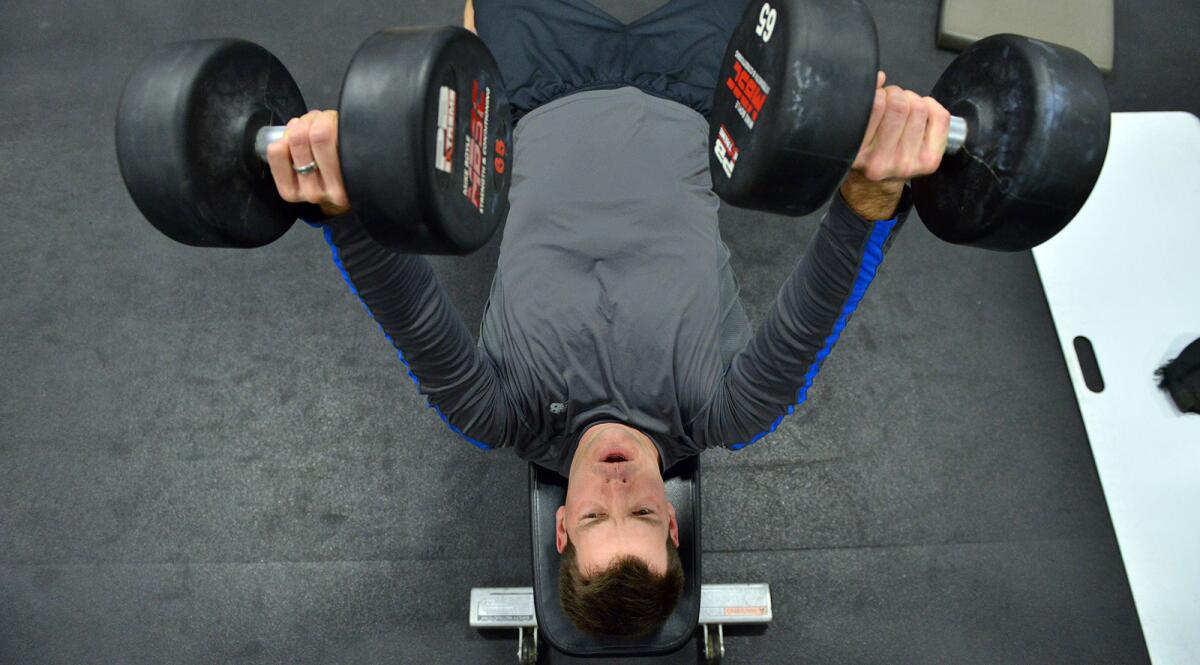
Dodgers pitcher Rich Hill works out at a gym in Woburn, Mass., on Jan. 18.
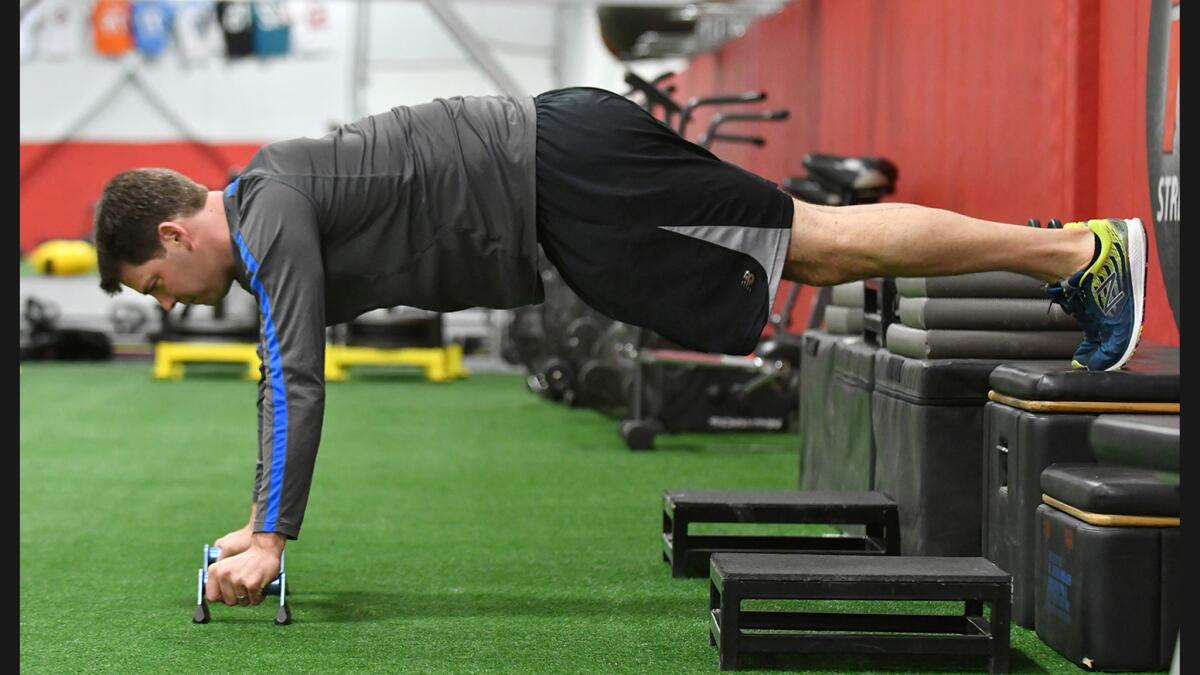
Dodgers pitcher Rich Hill works out at a gym in Woburn, Mass., on Jan. 18.
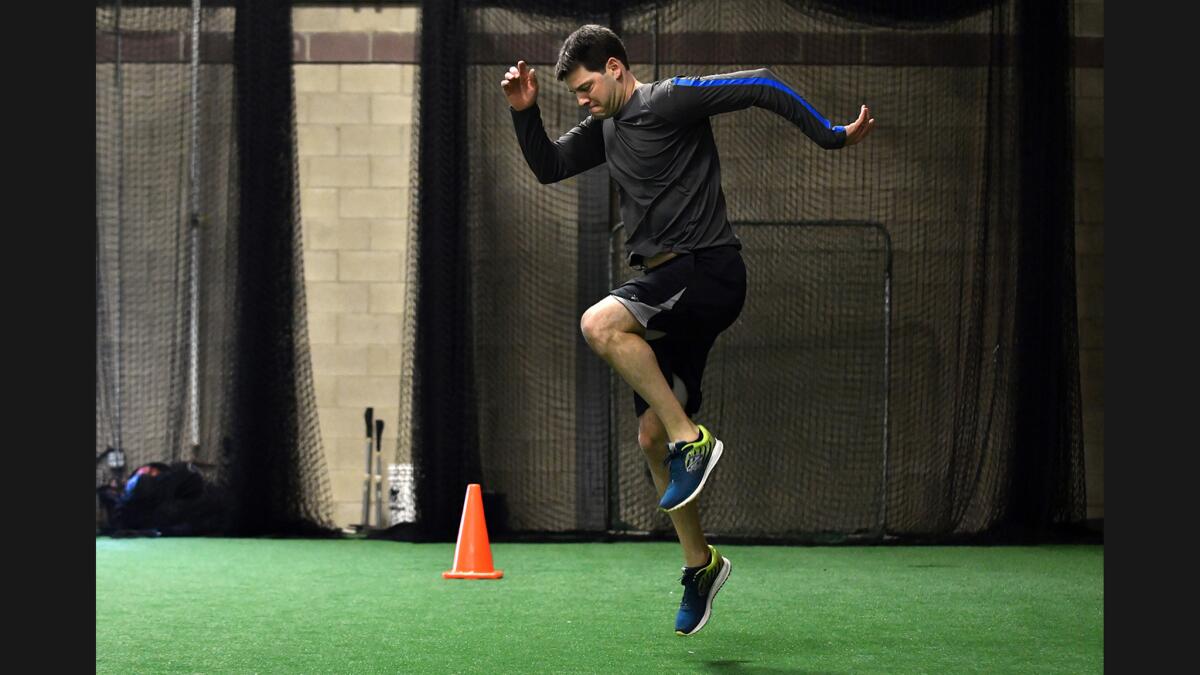
Dodgers pitcher Rich Hill works out at a facility in Woburn, Mass., on Jan. 18.
Reinold set Hill on a program of “dynamic stabilization” and exercises designed to strengthen his forearm, rotator cuff and scapula. Hill dove into the work, only to suffer torn elbow ligaments in 2011. After surgery, he dealt with a flexor strain in 2012.
By 2013, he was starting to throw without pain. He would pantomime pitching in his kitchen and tell his wife, Caitlin, “I feel like I can start again.” But the opportunities were scarce for a veteran in his 30s with a limited track record and a lengthy history of injuries.
Even now, Hill cannot be considered completely reliable. He missed nearly two months last season because of blisters on his left hand, which created enough worry that Manager Dave Roberts removed him after seven perfect innings during a game in Miami. Moving forward, the Dodgers have enough depth to compensate for occasional absences, but Hill lacks interest in being a part-time performer.
Which is why he goes to Boyle’s facility. Hill was right about that warmup set: He soon graduated to 65-pounders. After an hour with little wasted motion, he was finished with his workout. Another stone in the bucket.
At a diner down the road, breakfast awaited.
“You can follow me,” he told a visitor. “I’m the Honda.”
One Thanksgiving in Milton, Mass., when he was 12, Hill asked his brother Larry if they could have a catch. Larry had played for Boston College in the 1980s, so he could recognize talent. But what Rich could do was unnatural.
“The ball would break like a Wiffle Ball,” Larry said. “You know the classic six-holed Wiffle Ball, you put your finger on one hole, and it breaks like 10 feet? That was Rich. Like, ‘How is he doing it?’ Everybody has a gift.”
Rich was the youngest of five Hill children, born 14 years after the next-youngest sibling. His father was the principal at nearby Quincy High. Every night, Lloyd Hill ironed his shirt and shined his shoes for the next morning, a routine that “ingrained consistent work into me,” Rich said after he drizzled hot sauce over an egg-white omelet with feta and spinach.
Without struggle, there is no progress. Without failure there is no progress.
— Rich Hill
When his brothers played in the Yawkey Baseball League, Rich was the bat boy. Larry and Lloyd Jr. tried to school him as a right-hander, but their brother John taped Rich’s right arm behind his back so he could learn to be a southpaw. In second grade, for an assignment on what he wanted to be when he grew up, he wrote “
Rich learned the curveball grip from Lloyd Jr., who had pitched at Colby College. By the time he was finishing high school, Hill was good enough to get offered late-round money by the
Hill started dating Caitlin when he was a sophomore at Milton and she was a freshman. They got married in 2007 and settled in South Boston. In 2011, their first son, Brice, was born.
Caitlin became pregnant again in 2013. On the day after Christmas, she gave birth to a boy named Brooks. There were no issues during the pregnancy.
“You just think you’re going in, like, ‘Oh, yeah, we’re having a baby, everything is going to be fine,’” Hill said. “And that’s something else: You can’t take that for granted, whatsoever.”
But the doctors recognized a genetic issue. After two weeks of observation, Hill learned his son was experiencing kidney failure. More tests revealed a litany of issues. The fight lasted until February.
“You can’t have more pain and more tragedy than that,” Larry Hill said.
As he grieved, Rich Hill fixated on the precious nature of time. He realized his happiness in baseball revolved around success. He could not guarantee success. But he could guarantee his level of effort. He had learned to treasure each second with Brooks, and he decided he needed to find passion in each day, each outing, each pitch.
“It gives you a perspective of how delicate everything is,” Hill said. “You want to be moving toward things you want to do. Because, like that . . .”
He snapped his fingers.
“You have to understand the fragility of life, careers, whatever it might be, so you don’t take anything for granted.”
After breakfast, Hill steered his Pilot along a wooded road about 30 miles south of Boyle’s gym. When you’re wintering in Massachusetts, the search for a space to throw is a logistical puzzle. Obsessive about his routine, Hill had thrown against walls and asked Caitlin, a former softball player, to be his partner. These days he moves between Boyle’s place, the facilities at Boston College and the Canton SportsPlex.
Hill pulled in to the back lot of the SportsPlex, behind the hockey rinks. Waiting in the lobby was Jeremy Bleich, a former first-round pick of the
“It’s freezing in here,” Bleich said.
“Is it?” Hill asked.
They walked onto an indoor soccer field. Multiple signs warned against cleats on the turf. Another forbade baby carriages. After loosening up, Hill fired strikes across the length of the field. “Ow,” Bleich deadpanned.
Hill trotted to midfield. “I’m just going to spin a couple,” he warned.
“Curveball, right?” Bleich said.
The curve is Hill’s best pitch. Always was. But for most of his career he kept it holstered. Reliance on it violated the sport’s orthodoxy. Pitchers were supposed to lean on the fastball. So Hill abided, even when he couldn’t command the pitch.
Aching to break free of convention, and stuck at Washington’s triple-A affiliate in Syracuse, N.Y., Hill opted out of his contract in June 2015. On the drive home, Caitlin noted the conviction in her husband. No longer would he listen to suggestions from skeptics who saw him as a reliever. “He had always craved going back to starting,” she said.
Hill reminded one of his agents that Warren Spahn won 180 games after his 35th birthday. That summer, a couple months after he turned 35, Hill decided to ditch the side-arm approach. After years toiling with Boyle and Reinold, he felt his shoulder could handle the strain of an over-the-top delivery. He had been placing stones in the bucket long enough to build a mountain.
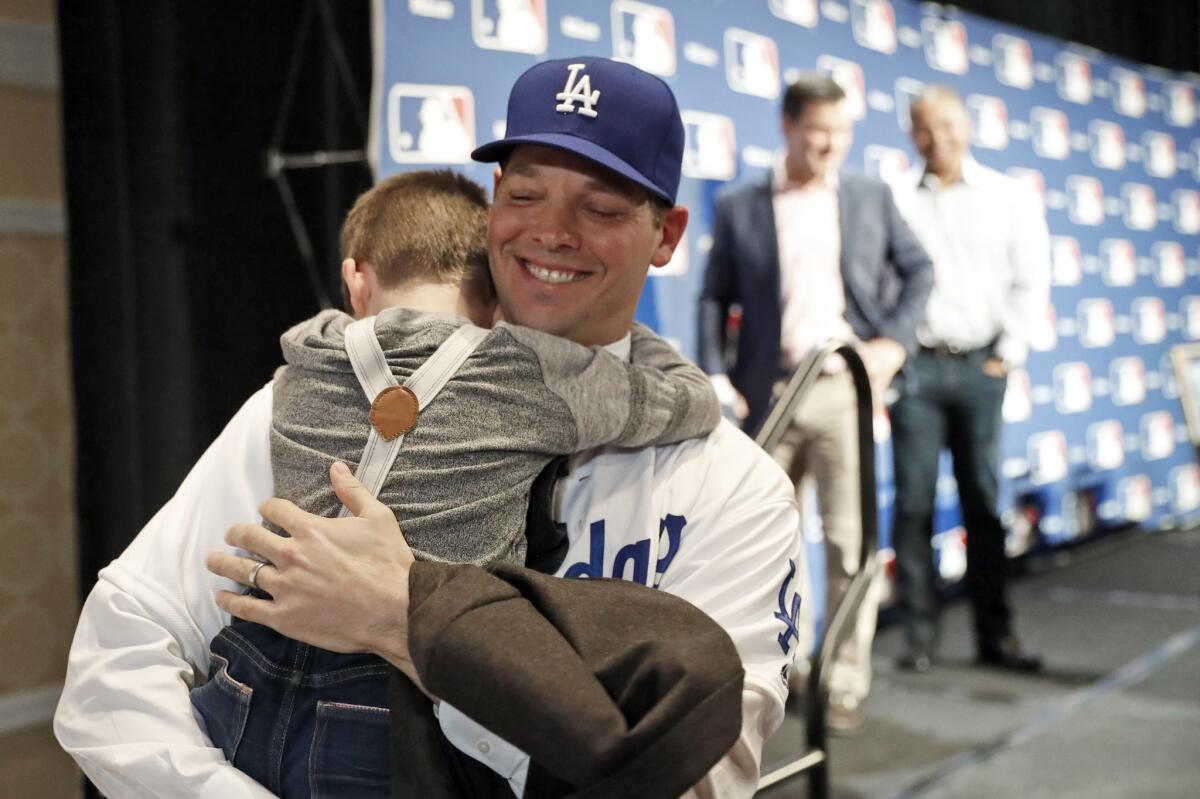
“I’m going to give this one more shot,” Hill told a longtime friend. “I’m going to try this my way.”
As the family scrambled to pay bills and find health insurance, Hill needed to find a throwing partner. He called his nephew, who played on an American Legion team, and asked if he could work out with the group.
One night, during a Billy Joel concert at Fenway Park, he revealed his plan to Boyle. “I remember saying, ‘Hey, great idea! Give it a shot,’” Boyle said. “But thinking, ‘This is a crazy way for it to end.’”
Searching for an opportunity, Hill asked
“The ball started barely in the zone,” Porter said. “And then it exploded up into the zone. With that natural life, it had more room to run, to move.”
Afterward Porter called his boss. “Rich Hill looked nasty today,” he said.
But Boston wanted to see Hill in a game, and they did not have an opening. So Hill signed with the
While at triple-A Pawtucket, Hill met Brian Bannister, a former big-leaguer working as a scout and analyst. Bannister had studied the data on Hill’s arsenal, and discovered what Hill’s brothers had learned decades before: an uncanny ability to manipulate a baseball, with the curveball as his vehicle for using it.
During an hour-long talk, Bannister lobbied Hill to use the curve as his primary pitch. He explained how Zack Greinke manipulated his changeup by varying the speed and the shape. Hill could do something similar.
“It was like this ‘Ohhhh’ moment,” Hill said. “I was just fascinated, because it was a totally different way of looking at pitching than I was used to. But I had always wanted to hear that.”
Bolstered by belief in his newfound approach, Hill returned to the majors Sept. 10 in Tampa Bay. He had gone 2,236 days between starts. He struck out 10 and gave up one hit in seven innings. Two weeks later, he pitched a shutout at Fenway, the same venue he visited as an unemployed concert-goer earlier in the summer.
His four starts enticed Oakland to offer him a $6 million deal for 2016. He flourished in Los Angeles after the Dodgers acquired him in August. In 20 starts last season, Hill posted a 2.12 earned-run average. He blanked the Cubs for six innings in the National League Championship Series during the final victory of the Dodgers season. Along the way, no starting pitcher threw curveballs more often than Hill.
As the breaking ball danced inside the chilly SportsPlex, Bleich turned to a visitor.
“Isn’t it your turn to come catch these?”
“How long have you been a Dodgers fan?”
The voice boomed from the far side of the hotel ballroom. His speech finished, Hill was fielding questions from the audience, showcasing his droll sense of humor.
“How long have I been a Dodgers fan?” Hill said. “Since I got traded last year.”
Hill was quizzed on the toughest park to pitch in (Yankee Stadium), the toughest hitters to face (
“
“Do you have a favorite manager you ever played for?” someone asked.
“Uh … Dave Roberts?” Hill said. The room burst into laughter. “To be honest with you,” Hill continued, “Dave has been incredible. He’s unbelievable.” Roberts, he explained, allowed players to be themselves.
It took Hill nearly 15 years in baseball to discover himself, but he emerged in full bloom with the Dodgers last fall, eyes bulging with emotion while he was befuddling opponents with his curveball and skipping off the mound.
Hill’s interests outside of baseball are admittedly limited, but he is learning to use his platform. He and Caitlin want to set up scholarships in Brooks’ name. They are building a house in Milton. Rich is learning how to share his story, knowing its impact extends beyond his sport.
After his speech in Connecticut, Hill signed autographs and posed for photos. He was the last person to leave the ballroom, cradling a cardboard box filled with the gifts he received during the ceremony. As he exited, a woman approached. She told him she loved the message in his speech, even if she wasn’t much of a baseball fan.
“Oh,” Hill said. “That’s OK.”
Then he put down the box and started to listen.
Lead photo caption: Dodgers pitcher Rich Hill pumps his fist after striking out Chicago Cubs' Anthony Rizzo during Game 3 of the National League Championship Series on Oct. 18 at Dodger Stadium. (Robert Gauthier / Los Angeles Times)
Twitter: @McCulloughTimes
ALSO
Dodgers’ Roberts expects Forsythe to lead off, outfielders to compete for at-bats
Yasiel Puig says he wants to be a starter, whether it's with Dodgers or not
Shaikin: Jose De Leon trade a calculated move for the Dodgers
Are you a true-blue fan?
Get our Dodgers Dugout newsletter for insights, news and much more.
You may occasionally receive promotional content from the Los Angeles Times.




